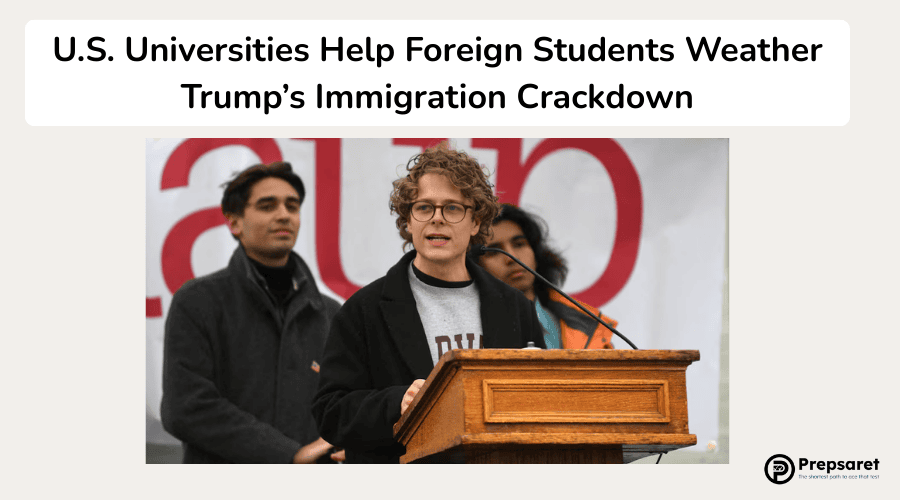Highlights
- U.S. universities are advising international students on how to stay enrolled amid immigration crackdowns.
- Over 4,700 students have been removed from the SEVIS visa database—almost half of them from India.
- Some students have self-deported, while others are continuing coursework under legal protection.
- The $44 billion international student economy is at risk.
- Federal officials are urging those with revoked status to leave, while schools seek legal remedies.
U.S. Universities Help Foreign Students Weather Trump’s Immigration Crackdown
WASHINGTON, April 25, 2025 — As the Trump administration intensifies immigration enforcement, U.S. universities are stepping in to support international students facing visa challenges, legal uncertainty, and potential deportation.
From legal guidance to coursework accommodations, schools are working to shield students caught in the crosshairs of the administration’s immigration policies.
Legal Pressure and University Response
Following the arrest of several foreign students linked to pro-Palestinian demonstrations, thousands of international students have been targeted for deportation—many for minor legal infractions or administrative errors.
According to the American Immigration Lawyers Association (AILA), U.S. Immigration and Customs Enforcement (ICE) has removed over 4,700 names from the Student and Exchange Visitor Information System (SEVIS), citing alleged criminal behavior. Nearly half of those affected are Indian nationals, many enrolled in Optional Practical Training (OPT) programs.
Despite federal pressure, university officials are quietly advising students to remain enrolled and seek legal counsel. “For the most part, the students I’ve spoken to, their schools are permitting them to keep attending classes,” said Clay Greenberg, a New York-based immigration lawyer representing students with SEVIS revocations.
Some 200 students have won temporary court injunctions preventing the government from taking further action while their cases proceed. “Those who contest being deleted from SEVIS would be allowed to continue studying,” confirmed an international student adviser from a major U.S. university, who requested anonymity.
Institutional Pushback and Economic Stakes
Higher education institutions have voiced strong opposition to the crackdown. Faculty at several universities have challenged the arrests in court, arguing constitutional violations.
MIT President Sally Kornbluth emphasized the value of international talent, stating her school “would be gravely diminished without the students and scholars who join us from other nations.”
Beyond the academic and humanitarian concerns, there are significant financial implications. According to the Association of American Universities, international students contributed $44 billion to the U.S. economy last year. More than half of the nation’s 1.1 million international students hail from India and China.
The University of California is actively exploring solutions to help students complete their studies, according to spokesperson Rachel Zaentz. George Mason University in Virginia has also urged students to consult with advisors about finishing their coursework.
With summer break on the horizon, Duke University has warned international students against leaving the country, citing fears they may not be permitted to reenter for the fall semester.
Rising Fear and Student Departures
The climate of fear is palpable among students. One Indian graduate student in the Southwest said he became hypervigilant after seeing videos of fellow international students being detained. “If I see anyone in a uniform, I turn around,” he said.
Others have already left. Momadou Taal, a dual citizen of the U.K. and Gambia who led protests at Cornell, departed voluntarily in March after being asked to surrender to immigration authorities. “I’ll be able to finish up remotely,” he explained.
Some students, even with dismissed charges, are still feeling the impact. An Indian student in Georgia, whose DUI charge was thrown out, said his legal status was still revoked. He continues to study but remains cautious.
Meanwhile, Department of Homeland Security Assistant Secretary Tricia McLaughlin doubled down on enforcement. “If you are in our country illegally, we will arrest, we will deport you, and you will never return,” she said in a public statement.
As legal challenges continue to mount, universities, attorneys, and students brace for a summer of uncertainty.
Also in the News:

